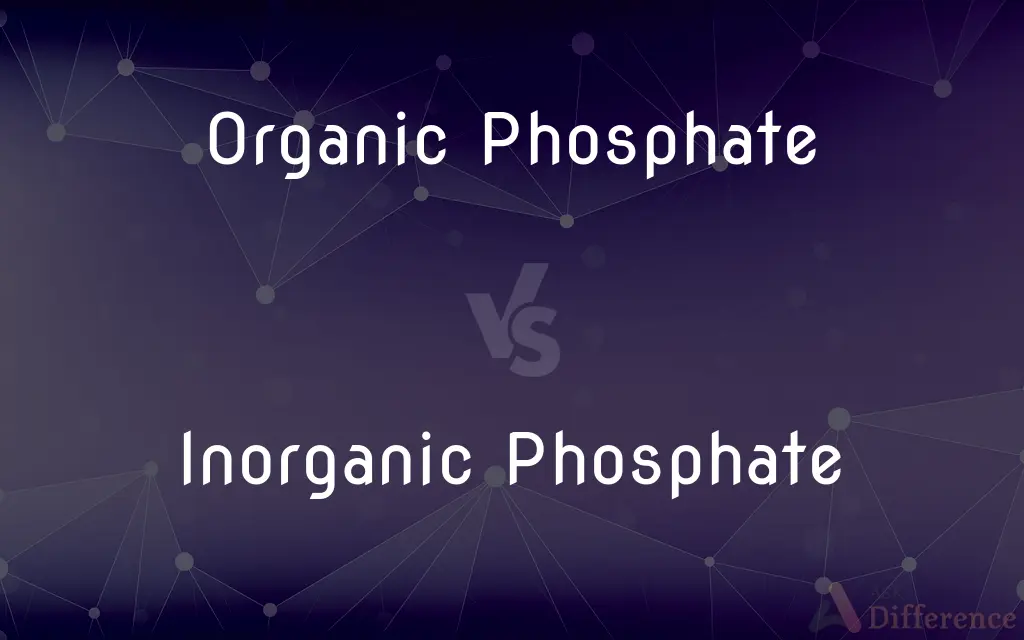Organic Phosphate vs. Inorganic Phosphate — What's the Difference?
By Tayyaba Rehman — Published on December 8, 2023
Organic Phosphate contains carbon and is part of biological molecules. Inorganic Phosphate lacks carbon and is often free or bound to minerals. Both are essential in biochemical processes.

Difference Between Organic Phosphate and Inorganic Phosphate
Table of Contents
ADVERTISEMENT
Key Differences
Organic Phosphate and Inorganic Phosphate are both forms of phosphorus found in various substances and systems. Organic Phosphate refers to phosphorus compounds that are part of organic molecules, meaning they contain carbon atoms. Such phosphates are commonly found in DNA, RNA, and ATP, playing a crucial role in cellular processes and energy metabolism. On the other hand, Inorganic Phosphate does not have carbon and is usually found in a free state or bound to other minerals, especially in salts or rocks.
In the realm of biochemistry, Organic Phosphate is a major player. When you think of Organic Phosphate, think of the energy currency of the cell, ATP, or the genetic blueprint, DNA. These compounds utilize the energy stored in phosphate bonds for various cellular activities. In contrast, Inorganic Phosphate often serves as a source of phosphorus for plants, entering the biological system through the food chain. When plants absorb Inorganic Phosphate from the soil, it becomes incorporated into Organic Phosphate compounds within the plants.
From a practical perspective, Organic Phosphate's presence in living organisms makes it integral for many life processes. It's involved in storing and transferring energy, facilitating chemical reactions, and forming genetic material. Inorganic Phosphate, while not directly involved in these processes, is crucial for the environment. It is a primary component of fertilizers, aiding plant growth, which indirectly supports life by entering the food chain.
In summary, both Organic Phosphate and Inorganic Phosphate play their unique roles in the grand scheme of life and the environment. While Organic Phosphate is directly part of biological systems and processes, Inorganic Phosphate supports these systems from the outside, especially through its role in agriculture and the natural environment.
Comparison Chart
Contains Carbon?
Yes, part of organic molecules
No, lacks carbon
ADVERTISEMENT
Commonly found in
DNA, RNA, ATP
Free state, bound to minerals, fertilizers
Role in Biochemistry
Energy storage, genetic material
Source of phosphorus for plants
Chemical Structure
Contains carbon-phosphorus bonds
Contains phosphate anions without carbon
Direct Role in Organisms
Integral for life processes
Indirect through support in plant nutrition
Compare with Definitions
Organic Phosphate
Integral to many biological reactions.
Enzymes often target Organic Phosphate groups during reactions.
Inorganic Phosphate
A form of phosphorus not bound to carbon.
Rocks and minerals often contain Inorganic Phosphate.
Organic Phosphate
A phosphorus compound found in organic molecules.
ATP, an energy molecule, contains Organic Phosphate.
Inorganic Phosphate
Primary component of many fertilizers.
Farmers add Inorganic Phosphate to soil to promote plant growth.
Organic Phosphate
Contains carbon atoms in its structure.
The presence of carbon atoms differentiates Organic Phosphate from its inorganic counterpart.
Inorganic Phosphate
Essential for plant nutrition.
Plants absorb Inorganic Phosphate from the soil for their nutrient needs.
Organic Phosphate
Crucial for energy storage and transfer in cells.
Energy is released when Organic Phosphate bonds in ATP are broken.
Inorganic Phosphate
Often found freely or in mineral deposits.
Natural reserves of Inorganic Phosphate are mined for various applications.
Organic Phosphate
Essential for cellular energy and genetic processes.
DNA, which carries genetic information, has Organic Phosphate in its structure.
Inorganic Phosphate
Does not form part of complex organic molecules.
In contrast to DNA, Inorganic Phosphate isn't part of any large organic structure.
Common Curiosities
What is the primary use of Inorganic Phosphate in agriculture?
Inorganic Phosphate is used in fertilizers to provide phosphorus for plant growth.
Why is Organic Phosphate important for energy processes?
Organic Phosphate, especially in ATP, stores and transfers energy for cellular activities.
Do both types of phosphates contain carbon?
Only Organic Phosphate contains carbon; Inorganic Phosphate does not.
What role does Organic Phosphate play in genetics?
Organic Phosphate forms a part of DNA and RNA, crucial for storing and transmitting genetic information.
What is Organic Phosphate commonly found in?
Organic Phosphate is commonly found in molecules like DNA, RNA, and ATP.
Can Inorganic Phosphate be directly used by cells for energy?
No, Inorganic Phosphate needs to be incorporated into organic compounds, like ATP, for direct cellular use.
Are Inorganic Phosphates good for all soils?
Not always. Excessive Inorganic Phosphate can lead to environmental issues like eutrophication.
How is Inorganic Phosphate typically represented chemically?
Inorganic Phosphate is often represented as Pi or PO₄³⁻.
Can plants directly utilize Organic Phosphate?
Plants primarily absorb Inorganic Phosphate from the soil, which they then convert to Organic Phosphate.
Is Organic Phosphate essential for all life forms?
Yes, Organic Phosphate is integral to many life processes across various organisms.
Why is Inorganic Phosphate significant for the environment?
Inorganic Phosphate in fertilizers supports plant growth, which indirectly sustains life through the food chain.
Can Organic Phosphate be found outside living organisms?
While primarily in living systems, some Organic Phosphates can be found in decayed organic matter or certain man-made compounds.
Which type of phosphate plays a direct role in energy transfer?
Organic Phosphate, particularly in ATP, plays a direct role in energy transfer within cells.
Can Inorganic Phosphate be transformed into Organic Phosphate?
Yes, through biological processes, organisms convert Inorganic Phosphate into Organic forms.
What's a common use of Organic Phosphate in energy metabolism?
Organic Phosphate in ATP provides energy for many cellular reactions.
Share Your Discovery

Previous Comparison
Lok Sabha vs. Rajya Sabha
Next Comparison
Require vs. WantAuthor Spotlight
Written by
Tayyaba RehmanTayyaba Rehman is a distinguished writer, currently serving as a primary contributor to askdifference.com. As a researcher in semantics and etymology, Tayyaba's passion for the complexity of languages and their distinctions has found a perfect home on the platform. Tayyaba delves into the intricacies of language, distinguishing between commonly confused words and phrases, thereby providing clarity for readers worldwide.
















































